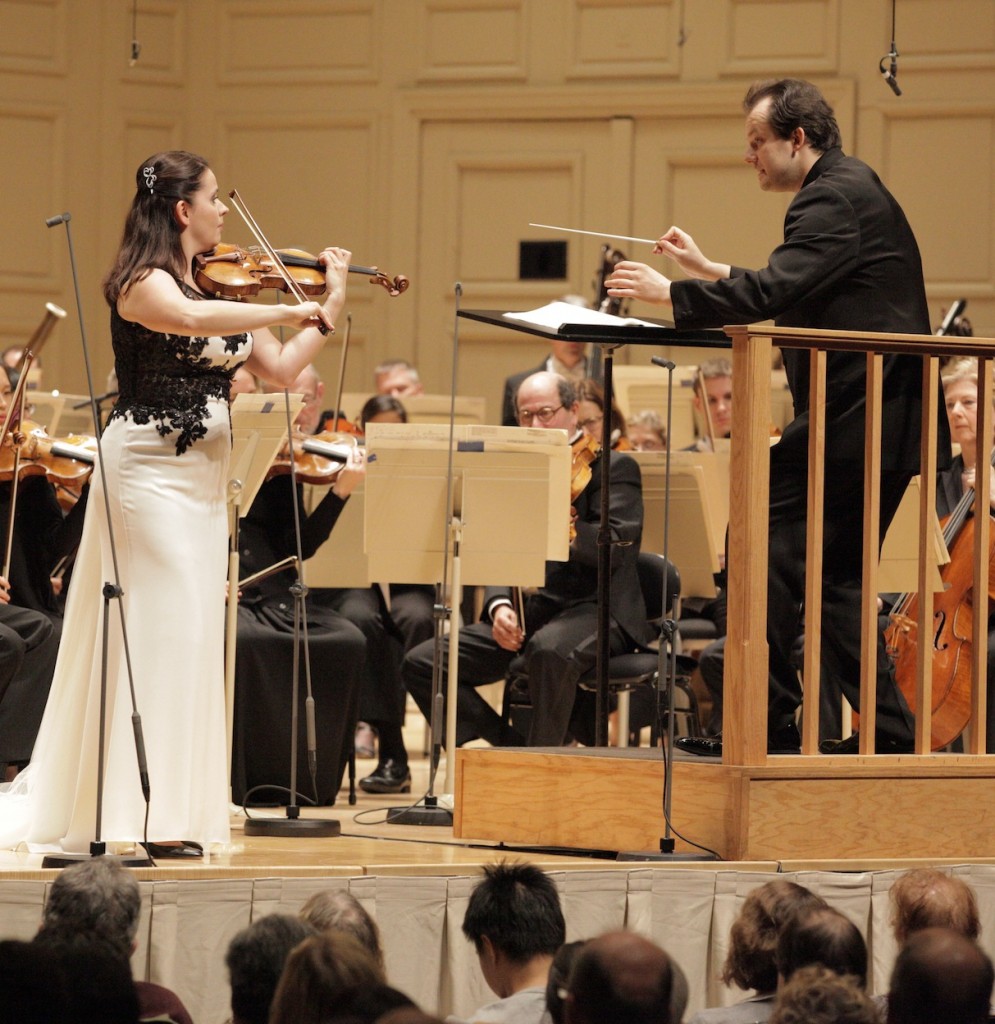Nelsons, Skride, bring sweep, bracing insight to Gubaidulina and Sibelius with BSO

Baiba Skride performed Sofia Gubaidulina’s “Offertorium” with Andris Nelsons and the BSO Thursday night. Photo: Hilary Scott
Music composed in spite of oppression always seems to carry an extra charge, as the Boston Symphony Orchestra, led by its music director Andris Nelsons, demonstrated Thursday night.
Nelsons was just ten years old in 1989, when the Berlin Wall came down and the Soviet domination of his native Latvia began to lift, but he conducted Sofia Gubaidulina’s 1980 work Offertorium, Concerto for Violin and Orchestra, and Sibelius’s patriotic Second Symphony like a man who knew whereof the music spoke.
The conductor and his fellow Latvian, violinist Baiba Skride, seemed on home ground with Gubaidulina’s Slavic spirituality and the trans-Baltic sensibility of Finland’s most celebrated composer.
Though not facing the same threats to life and limb that her countryman Shostakovich had during the Stalin era, Gubaidulina nevertheless composed her deeply spiritual violin concerto under a Soviet regime whose ideology remained hostile to religion. Official indifference and scant opportunity for performance were her rewards for being one of her nation’s most gifted composers.
Despite adopting the French form of his first name, Jean Sibelius was a proud Finn who composed national epics even as the pre-Soviet Russian empire was attempting to stamp out the Finnish language and culture. Even without a nationalist title such as Kullervo or Finlandia, his Second Symphony stirred patriotic fervor with its bucolic scenery, yearning melodies, and heroic finale.
Both composers were endlessly inventive with orchestral color, so on Thursday what might have appeared a slightly stingy program of just two works turned out to be a feast for the ear.
Skride, who made a brilliant impression last season with Nelsons and the BSO in Shostakovich’s bleak yet fiery Violin Concerto No. 1, returned Thursday in a different role, that of celebrant at a ceremony.
Playing the complex work from memory, and wearing an unwavering expression of calm concentration, Skride produced a consistently slender, sweet tone that nevertheless carried over the large orchestra’s most robust outbursts.
The egotism implied in the title “concerto” was absent from this performance. Even in her part’s most athletic moments, Skride seemed more the vessel than the interpreter of this music.
But then, the idea of sacrifice was, as Harlow Robinson’s program note pointed out, at the heart of this Offertorium, which took as its starting point another famous “musical offering,” that of the aged J.S. Bach to Frederick the Great, King of Prussia. The German word Opfer means both offering and sacrifice.
Gubaidulina’s piece began with a statement of the wickedly complex and chromatic theme with which the king tested Bach’s contrapuntal powers, then subjected it to dissection and illumination in the spirit of not only Bach’s own Ricercar a 6 on it, but Anton Webern’s delicate yet colorful orchestration of same.
Her transformational techniques were sometimes clearly evident, as when she turned the theme’s slithery chromatic motion into boldly smeary string glissandos, and at other times seemed known only to her and to God. The music’s protean moods shifted quickly from lyrical to agitated, from a sparkling leggiero with glockenspiel to a brash blare of dissonant brass.
Considering this composer’s inclination to religious symbols—she is said to see a cross in the intersection of bow and string—the sudden crescendos on a single note that occur throughout the work seemed particularly significant. Perhaps their stabbing sound represented the piercing of the sacrificial animal, or of Christ.
Notable interludes in the music included a fantastic unaccompanied meditation—“cadenza” would be too showy a word—for the violin at the work’s center, and a section in which solo instruments, led by the cello and viola, seemed to wander in the wilderness, yet produced a delicate, Webernesque tissue of counterpoint.
Over its eventful, uninterrupted 35 minutes, Gubaidulina’s score never palled or lost its way. Skride, Nelsons and the orchestra realized its sounds and sense with precision and imagination, and were rewarded with enthusiastic applause.
As has been his wont, Nelsons signaled to the soloist and many individuals and sections in the orchestra for bows, and never got around to taking one for himself.
The attention to detail that made the Gubaidulina performance so vivid was perhaps overdone a little in the otherwise brilliant performance of Sibelius’s symphony. In his zeal to illuminate the familiar score—or maybe out of delight in the orchestral Stradivarius that has been placed in his hands—Nelsons seemed to point out every rock and tree in the Finnish countryside.
But he also conducted with energy and sweep, and the tendency of this symphony to fall into a plodding pace was mostly avoided. The work’s opening throbbed like a patriotic heart, and the Andante grew steadily from furtive pizzicato to dire warnings.
The players executed the Eroica-style scherzo with a fine balance of precision and urgency, and the bucolic trio with freedom and a tender rubato.
The crescendo transition to the finale’s noble theme recalled another Beethoven symphony, the Fifth. Here as there, the closing movement can seem like a big tune in search of a composition, but Nelsons made the most of each moment, and directed Sibelius’s long additive crescendos splendidly to their broad climaxes.
The grandeur and uplift of the fervent Finn’s closing pages brought the audience to its feet at the end. And finally, after again recognizing many individual players, the modest maestro had to bow to the inevitable and take one himself.
The program will be repeated 1:30 p.m. Friday and 8 p.m. Saturday and Tuesday. bso.org; 617-266-1200.
Posted in Performances
Posted Nov 10, 2014 at 4:14 am by Joel Stein
The Sibelius sounded like Tchaikovsky- Overwrought.
Posted Nov 13, 2014 at 2:07 pm by marc
THE SIBELIUS WAS EXCELLENT. WHAT WINDS AND BRASS, AND THE LUSH STRING SECTION.THE BOSTONIANS ARE BEST IN THIS MUSIC. A GREAT ORCHESTRA MADE GREATER BY ANDRIS NELSONS.